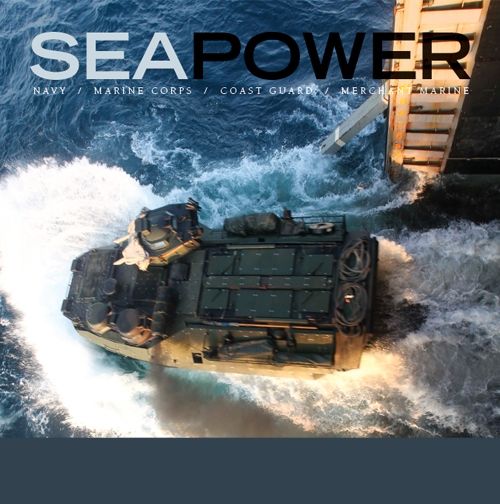Archive for the ‘military’ category: Page 281
May 13, 2016
The military just built the most advanced prosthetic arm we’ve ever seen
Posted by Shailesh Prasad in categories: biotech/medical, cyborgs, military
May 13, 2016
Pentagon News And Updates: Reveals Amazing Technology; DARPA Enters Pentagon’s Domain With Game Changer Tech For Security
Posted by Karen Hurst in categories: military, security

https://youtube.com/watch?v=Gd3tN4H0NjY
Pentagon and DARPA’s path collide to showcase game changing technology.
May 12, 2016
Pentagon Turns to Silicon Valley for Edge in Artificial Intelligence — By John Markoff | The New York Times
Posted by Odette Bohr Dienel in categories: defense, military
“In its quest to maintain a United States military advantage, the Pentagon is aggressively turning to Silicon Valley’s hottest technology — artificial intelligence.”
Tag: Silicon Valley
May 12, 2016
DARPA’s Mind-Controlled Robotic Arm Does Everything
Posted by Karen Hurst in categories: military, robotics/AI
MAY 12, 2016, WASHINGTON (Army News Service) – “This is the most advanced arm in the world. This one can do anything your natural arm can do, with the exception of the Vulcan V,” said Johnny Matheny, using his right hand to mimic the hand greeting made famous by Star Trek’s Leonard Nimoy. “But unless I meet a Vulcan, I won’t need it.”
Matheny was at the Pentagon, May 11, 2016, as part of “DARPA Demo Day,” to show military personnel the robotic arm he sometimes wears as part of research funded by the Defense Advanced Research Projects Agency. DARPA is an agency of the U.S. Department of Defense responsible for the development of emerging technologies for use by the military.
Continue reading “DARPA’s Mind-Controlled Robotic Arm Does Everything” »
May 12, 2016
Advisory Committee expresses Quantum, legacy system concerns
Posted by Karen Hurst in categories: military, privacy, quantum physics, security
NSA meets with Silicon Valley execs to voice their concerns over legacy systems being hacked by Quantum technology. Glad they’re talking about it because with the recent advancements in Quantum means it will be available in devices, communications, and platforms a lot sooner than originally projected.
The National Security Telecommunications Advisory Committee (NSTAC) brought together Silicon Valley executives with federal officials at the advisory committee’s annual meeting on Wednesday in Santa Clara, California.
U.S. military and intelligence officials, including Department of Defense Secretary Ash Carter, Department of Homeland Security Secretary Jeh Johnson, and Department of Commerce Secretary Penny Pritzker, attended the advisory committee.
Continue reading “Advisory Committee expresses Quantum, legacy system concerns” »
May 12, 2016
From robotic hands to ‘gecko feet’, Pentagon’s DARPA research agency showcases future tech
Posted by Karen Hurst in categories: cyborgs, military, robotics/AI
Fun stuff.
Johnny Matheny’s handshake is friendly, confident and firm — though not in the bone-crushing manner favoured by some of the alpha types here in the Pentagon.
What is remarkable is that Matheny’s proffered hand is not actually his. It is part of a robotic prosthesis researchers hope one day could help transform the lives of countless amputees.
Defense Department scientists are working on a new, digital night vision and thermal device that’s smaller and lighter than the Army’s latest Enhanced Night Vision Goggle.
The PIXNET camera is designed to provide small combat units with a “helmet mounted shortwave and longwave infrared blended imager with wireless networking capability,” according to officials from the Defense Advanced Research Projects Agency at the May 11 DARPA Demo day at the Pentagon.
Currently, soldiers use the Enhanced Night Vision Goggle, or ENVG. The Army began fielding the first generation of the ENVG in 2009 and has since fielded a slightly improve version in the ENVG II.
Continue reading “DARPA Working on New Night Vision Device” »
May 10, 2016
DARPA is building acoustic GPS for submarines and UUVs
Posted by Karen Hurst in categories: government, military, mobile phones, satellites
A new underwater GPS.
For all the benefits that the Global Positioning System provides to landlubbers and surface ships, GPS signals can’t penetrate seawater and therefore can’t be used by oceangoing vehicles like submarines or UUVs. That’s why DARPA is creating an acoustic navigation system, dubbed POSYDON (Positioning System for Deep Ocean Navigation), and has awarded the Draper group with its development contract.
The space-based GPS system relies on a constellation of satellites that remain in a fixed position relative to the surface of the Earth. The GPS receiver in your phone or car’s navigation system triangulates the signals it receives from those satellites to determine your position. The POSYDON system will perform the same basic function, just with sound instead. The plan is to set up a small number of long-range acoustic sources that a submarine or UUV could use to similarly triangulate its position without having to surface.
Continue reading “DARPA is building acoustic GPS for submarines and UUVs” »
May 10, 2016
Draper Gets DARPA Contract to Improve Stealth Capabilities for Undersea Vehicles
Posted by Karen Hurst in categories: government, military, robotics/AI, surveillance
I love contract season with the US Government because you get to see all of the cool projects being awarded.
CAMBRIDGE, MA — The U.S. military’s unmanned underwater vehicles (UUVs) depend on stealth as they conduct surveillance and reconnaissance and other missions in the deep oceans. With Global Positioning System (GPS) signals unable to penetrate the ocean’s surface, these UUVs can rely on inertial sensors to provide acceptable positioning information during short missions. On longer missions, however, inertial sensors accumulate error, forcing the vehicles to risk exposing themselves to enemies as they periodically surface to obtain a GPS fix.
The Defense Advanced Research Projects Agency (DARPA) is addressing this issue by funding the development of a small number of acoustic transmitters that can be anchored to fixed locations around ocean basins to serve as an undersea navigation constellation, according to a May 10 release by the Cambridge-based nonprofit company Draper.















